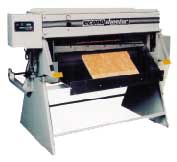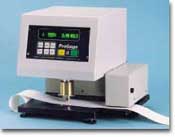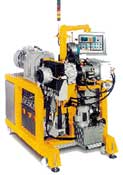System Solutions By ESI
Report on a systems integrator for textile finishing, nonwovens and the carpet
industry.Electrical Systems Inc. (ESI) established its roots 30 years ago. Back then, it was
conventional armature motors that the companys fathers rebuilt or replaced with better technology.
Today, ESI is a high-tech systems provider for applications in the textile industry and other
industries. For textile applications, the company concentrates on finishing, nonwovens and carpet
manufacturing. The company headquarters is located in Chattanooga, Tenn., and the company has a
service facility in Greenville, S.C.At the beginning of this year, ESI was acquired by the NSC
Group (N. Schlumberger Inc., France), which, according to company executives, will give the company
financial strength for growth and expansion into new areas, particularly the plastics, film and
paper converting industries.Mike Mauney, ESIs director of sales, emphasized the acquisition will
not affect the companys confidential cooperation with NSC competitors machinery manufacturers with
which large projects were already underway at the time of the merger. We would be a dead duck if we
abused the confidentiality agreements, Mauney said. ESI gets a wide range of customer orders
because of its reputation for understanding the manufacturing processes, and the companys worldwide
service commitment.Project Management PhilosophyESIs philosophy is to implement standardized
project management procedures for every project, regardless of its size, to ensure 100-percent
customer satisfaction. The following outlines some of ESIs key project-management procedures:
- assignment of a project engineer to supervise the project from design to start-up;
- charted project organization to determine bottlenecks and to minimize timing problems for
delivery;
- regular project status updates and meetings;
- witness testing of systems prior to shipment;
- professional field staff start-up;
- complete engineering drawings for the system as installed;
- operator training; and
- spare parts recommendations.
ESI has grown and diversified over the years into different fields and kept up with the
advancements of the latest drive and systems control technology. The company has made it its task
not just to provide a system, but rather to evaluate the actual situation in a plant and to provide
the best possible and most economical solution for its customers. A team of highly specialized
engineers identifies and evaluates all control strategy options by analyzing the application and by
consulting with customer personnel. ESI calls this a one-on-one service for clients. Personal
contact is maintained with every client throughout the entire project. Because of this, ESI says it
has improved the overall performance of many customer mill, machine efficiency and product
quality.Modern Drive Technology: Latest Systems AppliedNo matter what drive technology is used on
older or new machinery, ESI offers system solutions to better control the manufacturing process.
With older drives, it is often much more economical to replace the conventional motors with AC or
DC drive technology. A cost calculation with return on investment (ROI) can clearly show what
modern drive technology can save on maintenance and service cost when compared to earlier
technology. At the same time, product quality improvements, better supervision and feedback from
the process are possible. Therefore, ESI has been a leader for many years in the integration of
drives and drive-oriented systems that include AC and DC drive systems, as well as stand-alone PLC
and automation systems. Lately the PC-based control systems have been in great demand because,
compared to PLC systems, they are low cost, flexible and offer quick serviceability. PC systems are
also much easier to expand than PLC based systems. ESI pointed out that the PC-based systems are
still not the solution for every application, but since the introduction of the Windows NT
operating software, the reliability of PC-based systems has improved significantly. In case of a
fatal hardware failure, it may be as easy as replacing the failed hardware and reloading the
software to get the system up and running again.Mauney emphasized that ESI is not strictly aligned
with only one electrical component manufacturer. The company enjoys an excellent relationship with
the worlds leading manufacturers of high-tech system solutions such as ABB, Magnetek, Reliance,
Rockwell Automation, Siemens, Toshiba, and many others. This gives ESIs engineers the freedom to
use the best from the best in the design phase for specific customer applications.Nonwovens, Carpet
And Finishing ApplicationsESI named a number of applications for which the company has installed
drive and control systems.The nonwovens field is an ever- growing market segment for ESI. Even
though ESI is owned by Schlumberger, which is also one of its largest clients, the company has
executed many projects that incorporate the Dilo Group, Fehrer and other suppliers that are
competitors to Schlumberger. At the end, what counts is that ESIs customer, the actual nonwovens
plant, needs to be satisfied with the specific control setup. And so far, the company has received
a lot of praise and repeat business.Besides nonwovens, which has typically been a dynamic industry,
the carpet manufacturing industry has seen many changes over the past few years. ESI has helped
these companies to stay productive through custom integration of sophisticated drive and control
systems. The company provides motor/reducer combinations selected for optimum efficiency and
durability. Further, ESI provides web-sensing devices and load cells to interface with process
lines. For every application, the options range from simple armature, voltage-controlled DC drives
to fully integrated systems with multiple PC-based MMI systems and state-of-the-art AV vector
drives incorporated in custom enclosures.Also important to ESI are finishing applications for
warpers, slashers, preparation ranges, mercerizers, tenter ranges, conventional dye ranges, indigo
dye ranges, and sanforizers.Other growing fields of activities for ESI include the plastics and
film industries and the paper converting industry. Especially in the plastics and film, the capital
investment is very high and, therefore, requires efficient, smooth-running processing machinery.The
Electrical Systems Inc. AdvantageIn summary, ESI emphasizes that for a customer they are the single
source of responsibility that tailors equipment and services specifically to each customers needs.
Usually, this permits a more efficient system layout with lower investment cost. All equipment and
services come from domestic suppliers, which reflects in lower maintenance cost. As well, the
company offers seven-day, 24-hour service for its customers.
November 2000







